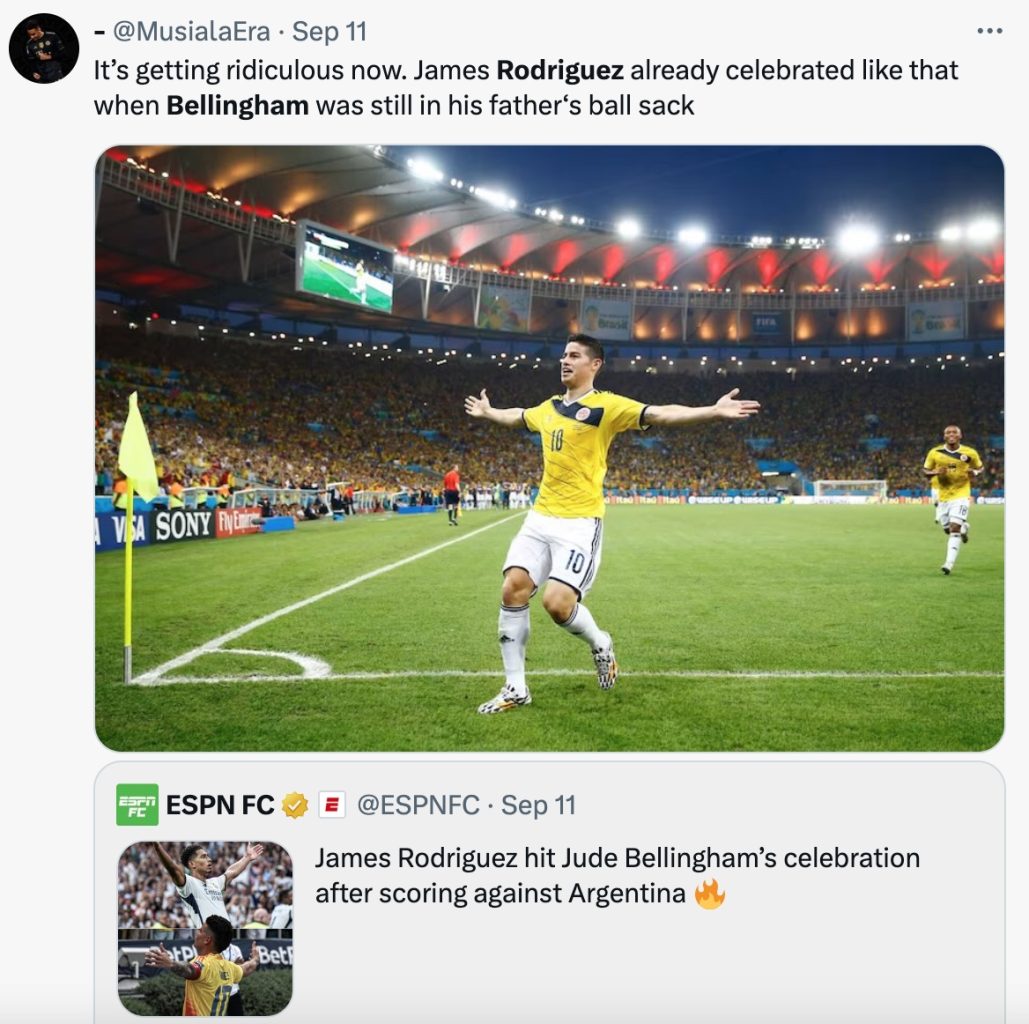The latest misstep in the world of football media comes from American sports media giant ESPN. The sports network claimed that James Rodriguez’s celebration in Colombia’s win over Argentina was a direct imitation of Jude Bellingham’s “signature” move.
The celebration came after Rodriguez slotted away a penalty given away by Enzo Fernandez after an extremely long VAR check.
Rodriguez showed his experience by smashing it into the top right corner and not being swayed by Emi Martinez’s antics. The goal gave the Colombians a well deserved lead who went on to win 2-1 at home.
The penalty from Rodriguez also ensured that Colombia maintained their unbeaten run in the CONMEBOL Qualifiers for the 2026 World Cup.
According to ESPN, Rodriguez’s gesture of standing with his arms wide open in front of the crowd was an homage to Bellingham’s own celebratory style.
However this assertion has sparked widespread ridicule, as fans have all pointed out the glaring inaccuracies in ESPN’s audacious claim.
Let’s set the record straight. Rodriguez’s arms wide celebration is not a novel gesture introduced by Jude Bellingham.

What can be said is that Bellingham has made it his own in the last year or so, owing to his exceptional performances and goalscoring form. Jude Bellingham has been the most popular user of this celebration over the past two seasons.
But the truth is James Rodriguez has been using this celebration for years. The most famous instance thats doing the rounds is during his standout World Cup campaign.
Rodriguez pulled out the same celebration on multiple occasions in th 2014 Brazil World Cup where the Colombian finished as top scorer with 6 goals.
Infact, during the 2014 World Cup, Real Madrid’s starboy Jude was just 11, probably banging in some goals in his school playground. This fact puts ESPN’s claims into perspective. The only way this makes sense is if ESPN was reporting on Bellingham aged 11, and covering the celebrations he might have been pulling off back then.
Rodriguez’s celebration predates Bellingham’s rise as a top player by nearly a decade, making any comparison between the two inherently flawed.
But Rodriguez isn’t the only player to have used this iconic celebration. Lionel Messi has also been known to employ a similar gesture on few occasions, extending his arms wide as he basked in the Culers adulation.

Dani Alves, Jamie Vardy, Wayne Rooney are all players who have used the celebration in the past, or atleast have used a similar celebration, signifying that the celebration cannot be Bellingham’s.
In all honesty, the arms wide-open celebration is a common motif among footballers, symbolizing a universal expression of triumph and connection with fans rather than a unique trademark of any single player.
The real issue at hand is not just ESPN’s reporting error, but the broader tendency of media at times to create sensational narratives.
By suggesting that Rodriguez’s celebration was an attempt to mimic Bellingham, ESPN not only misrepresents the origins of the gesture but also injects unnecessary drama into what should be a straightforward celebration of a goal.
This has further pushed the Real Madrid and Bellingham “PR” narrative, that media outlets serve more of a responsibility to elevate certain players and clubs rather than report the facts as the are.
The blunder has been nothing short of explosive, twitter users have had a field day and have showed no hesitation in mocking ESPN’s claim.
Fans displayed their creative side with multiple memes and replies, with some even tagging Twitter’s community notes to do their thing and give context to ESPN’s post.
One of the best memes produced involved a image dated to 1808 that looks to be of an execution. In the image a person can be seen standing with his arms wide.
Someone doing Bellingham's celebration in 1808 before Executions pic.twitter.com/Iaj770KUkZ
— RJ32 (@ktp_fcb) September 11, 2024
The image, which actually depicts a person throwing his arms wide moments before being executed, has been humorously repurposed by football fans, probably making it the earliest known instance of the arms wide celebration.
Ultimately, ESPN’s misstep serves as a reminder that while players today may popularize certain celebrations, they don’t own them. Football history is full of iconic gestures that transcend eras, and attempts to rewrite or simplify these narratives can often fall flat.



